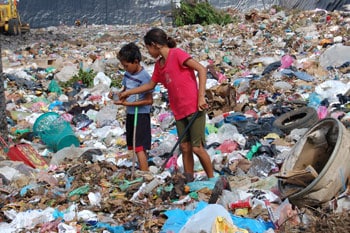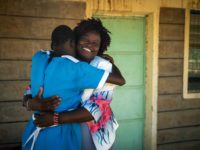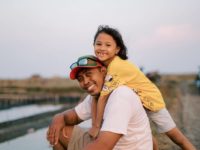Garbage is everywhere. Two children and their mothers used to trudge over the piles, holding a hook to dig in garbage. They were here at the dump at 5 or 6 in the morning every day.
Nearly 150 children used to work at this dump in León, Nicaragua, looking for food and other necessities, helping their families’ financial situations by collecting recyclable material like plastic, glass and metal that could be sold later.
Juan Carlos and Fatima are two children from two different families who were part of that number.

Almost every day Juan Carlos’ and Fatima’s mothers collected cans, copper and plastic bottles to sell at the end of each week. On a good week they’d get $5 to $10. The children went with them when there were no classes or activities at their child development center.
At the dump they were exposed to the hot Central American sun and an unsafe and unhealthy environment, punctuated with bad smells, flies, dirt and rotten food.
“I ask the Lord to take care of me because anything can happen at the dump. This year someone was killed in a fight for trash,” says Yolanda, Fatima’s mom.
“Trucks and vehicles that come in the dump move with no precaution, especially when it’s raining the ground gets slippery, and if someone is behind the truck, they can be killed,” says Maria, Juan Carlos’ mom.
Other dangers at the dump include exposure to violence, sexual abuse or getting burned with the trash.
A child burned her feet when she stood up on trash that was burning underneath. Also, if parents are not careful when trucks are unloading garbage, children can be buried in it.
Living by the river for some years so close to the dump and working at the dump led to health problems such as skin and respiratory illnesses, undernourishment, lice and allergies.
Through the medical checkups the children receive at their child development centers, the staff identified that these two children were undernourished. Both now receive complementary food three times a month, in addition to the food they regularly receive at the center.
They have also received treatment for their skin problems.
Maria explains that before going to the dump, she used to work doing domestic work. When asked why she wouldn’t look for a job like that instead of going to the dump, she says that she makes more money going to the dump for half of the day than doing domestic work for 12 hours.
This is a sad reality; however, the center has helped Juan and Fatima see life differently by motivating them to study.
“Children have a different vision. They have other dreams like to finish a professional or technical career. No one of them wishes to continue at the dump,” says Maria Elena, the center director.
Fatima would like to be a doctor and would like to clean the dirty water in the community.
Juan Carlos wants to be a lawyer and would like to clean the streets of the community so that no one will put garbage on the street or in the wells.
“Most of the people in this community did not go to school. Those who did go only went up to second or third grade because they were a big family and not all of them could go to school, had children at an early age, or parents put them to work instead of study,” says Maria Elena.
Now, this is starting to change.
Two months ago the old dump was closed and a new one was opened where children are not allowed to work.
Adults with an assigned identification are the only ones who can go in, so parents will have to find something else for their children to do, like sending them to school or the child development center.
Instead of holding a hook to dig in the trash, the children can hold a notebook and a pencil — tools that will help them grow to be someone better, someone different.







10 Comments |Add a comment
This brings tears to my eyes! I’ve been to Nicaragua and seen the poverty first hand but I have never seen this… Thank you for bringing it into my living room, for breaking my heart, for showing me that change is possible and hope does exist. I will never look at a bag of garbage the same way!
Blessings on all that Compassion is doing to truly make a difference in the name of the Lord!
Katie
wow! I never get “immune” to this. This affected me greatly-my stomach is churning and my heart is yearning to do more. We are planning to take a trip soon to visit our precious Deysis in Nicaragua- I pray she has not experienced this. What a wonderful thing to set my eyes on her and wrap her with my arms for a huge hug!! Thank you for sharing this.
Wow, this article is devastating and hopeful at the same time. What these kids have to go through is terrible. I can’t imagine having to search through a dump just to survive. It’s heartbreaking. Thank the Lord that the dump was closed. That is the hopeful part. I hope that they will all be closed. I pray that every child will have a chance at hope through being able to go to school or a center. Thank God for Compassion. You guys are making a world of difference.
Fatima and Juan have beautiful dreams. I pray that they will become everything they want to be and more, by the grace of God. I will be praying for every child and family that has been in or is part of a situation like this. Thank you for enlightening us to this.
This is so difficult to comprehend. The danger, the filth, the futility. Yet they seem to have hope, hope that comes from the Lord. Truly, compassion is needed – compassion that drives us to action to make the lives of these children safer, healthier and that gives them a chance to succeed. Thank you for posting the realities of their daily lives.
We get so used to our own world that it’s easy to forget their are little ones for whom daily living is a real struggle- in some cases in an environment of trash.
I never thought that I would see this with my own eyes. Through various articles or websites I would see pictures of people including children searching for scraps to sell or looking for food to it. But it seemed far removed from me until I went to Brazil and saw the reality of it. My first thought was how could someone do that. After thinking about how society is sometimes arranged, I knew that sometimes one doesn’t have a choice. My thought progressed to how could one see this and not care. How could one see this, ignore it, live a carefree life and not try to help change the situation.
John,
Orfa is saying that most of the people in the community who did go to school only attended through second or third grade because they were from big families and the parents could only afford to pay for schooling for their children up to that level.
Thank you for this article – it is very informative. What do you mean when you said that the children could not go to school b/c they are from a “big family” and not all of them could attend.
Wow…as a mother I just cannot imagine letting my children go through a garbage dump looking for anything valuable. It’s unimaginable to me – we are so far removed from this desparation.
Thank you for bringing it to our attention so we can continue to pray and help release children from poverty.